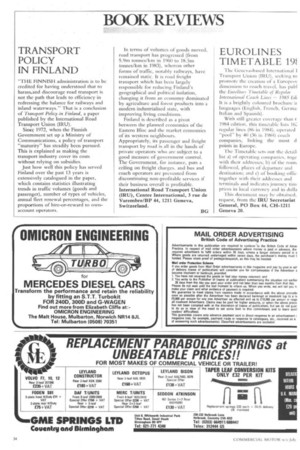TRANSPORT POLICY IN FINLAND
Page 36

If you've noticed an error in this article please click here to report it so we can fix it.
"THE FINNISH administration is to be credited for having understood that to harass,and discourage road transport is not the path that leads to efficiency in redressing the balance for railways and inland waterways." That is a conclusion of Transport Policy, in Finland, a paper published by the International Road Transport Union (IRU).
Since 1972, when the Finnish Government set up a Ministry of Communications, a policy of transport maturity" has steadily been pursued. This is explained as making the transport industry cover its costs without relying on subsidies.
Just how well this policy has served Finland over the past 13 years is extensively catalogued in the paper, which contains statistics illustrating trends in traffic volumes (goods and passenger), number of types of vehicles, annual fleet renewal percentages, and the proportions of hire-or-reward to ownaccount operators.
In terms of volumes of goods moved, road transport has progressed (from 5.9m tonnes/kni in 1960 to 18.5m tonnes/km in 1983), whereas other forms of traffic, notably railways, have remained static. It is road freight transport which has been largely responsible for reducing Finland's geographical and political isolation, changing it from an economy dominated by agriculture and forest products into a modern industrialised state, with improving living conditions
Finland is described as a pivot between the planned economics of the Eastern Bloc and the market economies of its western neighbours.
Appropriately, its passenger and freight transport by road is all in the hands of private operators who are subject to a good measure of government control. The Government, for instance, puts a ceiling on freight charges. and bus and coach operators are prevented from discontinuing non-profitable services if their business overall is profitable. International Road Transport Union (IRU), Centre International, 3 rue de Varembre/BP 44, 1211 Geneva, Switzerland.
BG












































































